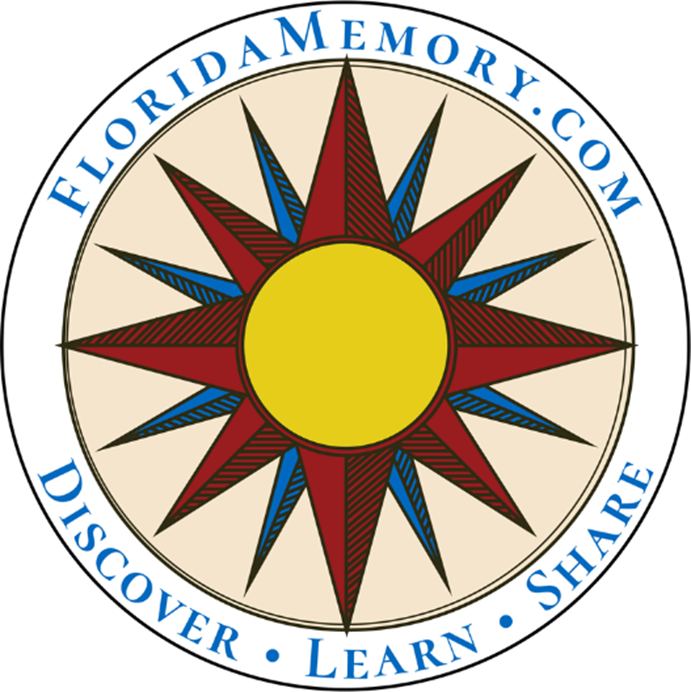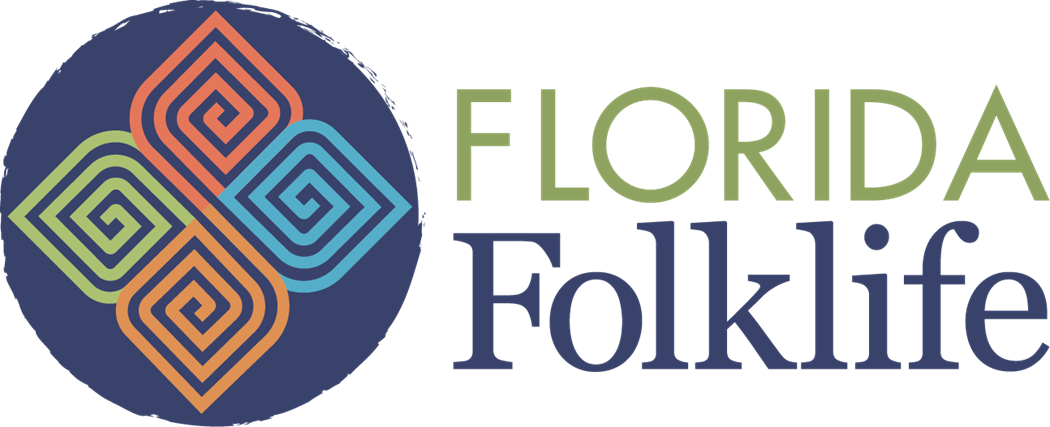
Folklife Area
Sharing Florida's Traditional Culture
Each year the Florida Department of State's Florida Folklife Program presents the Florida Folklife Area of the Festival.
The term folklife refers to the living traditions practiced and passed down within groups by word of mouth, imitation or observation. Folklife is a mirror that reflects community values, challenges and successes. Florida folklife is shaped by the state’s tremendous diversity and growth, creating a rich cultural landscape.

What's New at Florida Folklife?
Housed within the Division of Arts and Culture in Tallahassee, the Florida Folklife Program has documented, presented, and preserved Florida’s vibrant folklife and traditional culture for more than forty years. State Folklorist Dr. Dom Tartaglia and folklorists Dr. Mathilde Lind and Zachary Moreau completed the 2024 Fieldwork Survey, conducting ethnographic research on traditions involving the Air in Florida. Apart from the fieldwork survey and last year’s festival, Dom presided over the nominations of the 2025 Folk Heritage, coordinated the 2024 Artist Residency (with Heritage Award winners The Ukrainian Dancers of Miami) and coordinated the 2024-25 Apprenticeship Program (all four teams will perform on the Folklife Stage). Dom would also like to welcome a new face to the Folklife Stage: folklorist Julian Duncan! A PhD candidate at FSU’s College of Music, Julian is the director of Florida Folklife’s newest program, the Major John Leroy Haynes Florida Veterans' History Program. You will see him and several veterans who he has interviewed at the “Florida Veterans’ History Spotlight on Aviation”. We are very excited to have Julian at the Division and honored to be entrusted with stewarding the new Veterans’ Oral History Program going forward. Also, around the stage this year, you may find FSU students assisting with operations.
Air
For four years at the Folk Festival, the Folklife Area has covered how the elements influence traditions in the state of Florida. Based on survey fieldwork conducted in 2024, the theme of this year’s Folklife Area is Air. The element of air provides a particularly useful central theme for this survey of Florida’s arts and culture. For one it is so intrinsically linked to the other elements we have featured on the stage — water, fire, and Earth — that is already so present in so many folk traditions. Fire needs air to feed the flames, the ocean is nothing without the breeze, and the earth and open work together so perfectly. Air is humanity’s first power source, whether it is the wind or breath. Many of our acts on stage use air to make music, like accordions, trombones, or bagpipes. Some people defy the laws of gravity and stay suspended in the air to the crowd’s delight. Some traditions take care of animals with wings, and some venerate the air personified, but we all create traditions involving the ever-present, life-giving and powerful element which surrounds us.
The tradition bearers on the Folklife Stage come from across our state, from Miami to Tallahassee, Jacksonville, Central Florida and many more places. This year, the stage brings you seven Air tradition bearers, four teams from the Apprenticeship Program, several partners from across the festival and across the state.
Enjoy a weekend of entertainment, participation and exhibits.
Along the banks of the historic Suwannee River in White Springs, Florida, folk artists long have gathered to celebrate Florida’s land, people and diverse cultural heritage. Since its humble beginning in 1953, the Florida Folk Festival has not only grown to become Florida’s most prestigious affair but also is named “Florida’s Best Cultural Event.” The festival has also been recognized by the Southeast Tourism Society as a “Top 20 Event” in the southeastern United States.
Featured performers are listed below. Many will be performing or teaching workshops throughout the weekend along with our special guest artists. You can even dance the night away each evening with a variety of dances. Get ready for a fun and entertaining weekend for the entire family!
Sikan Afro Cuban Dance Project
Sikan Afro Cuban Dance Project is a dance company that performs traditional Afro Cuban dance with throughout Florida and the United States. Led by 2024 Florida Folk Heritage Award winner Marisol Blanco, the group aims to both entertain and educate by giving audiences “a panoramic vision about the Cuban heritage.” A dancer, teacher, and keeper of Afro-Cuban religious traditions, Marisol Blanco has spent her life teaching and performing Afro-Cuban arts and culture. She started dancing in her native Cuba at the age of five, and by sixteen she was teaching Afro- Cuban dance classes. Additionally, she learned bata, the syncopated ritual drumming style traditionally only taught to men, and became a member of Obini Bata, Cuba's first female percussion ensemble.
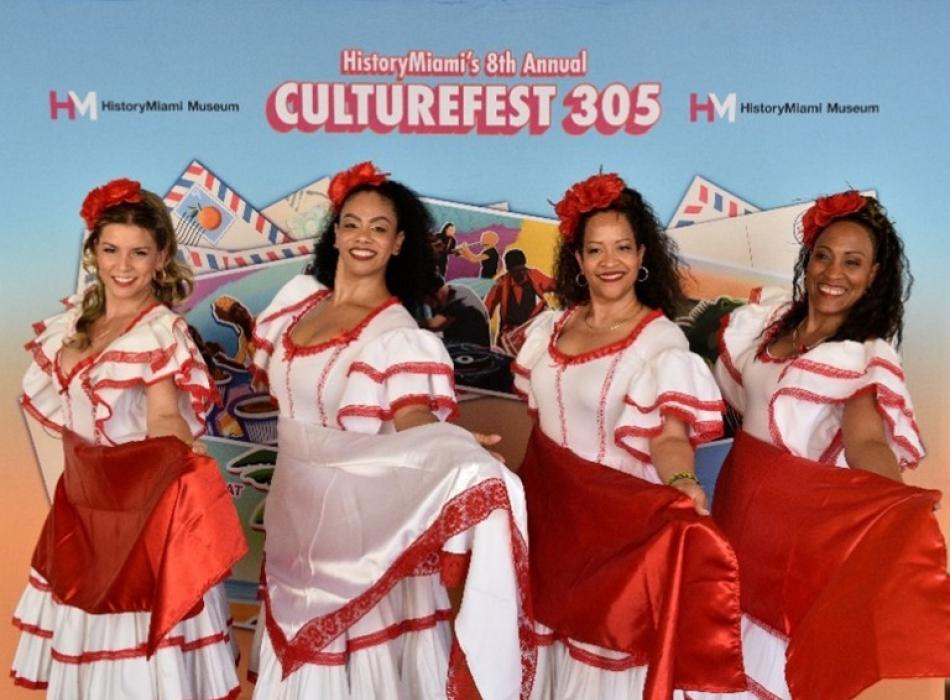
Marisol completed an MFA in Dance at the Cuban Superior Arts Institute and she is working on her second master’s degree from Jacksonville University. Marisol served as a master artist in the 2013 Florida Folklife Apprenticeship program, which provided her a push forward in her career as a folkloric artist, introducing her to a broader academic audience in her new home of Miami and across the United States.
The Spirit of Joy Shout Band
Taking inspiration from Psalm 98, you can hear trumpets and brass making joyful noise with the Spirit of Joy. Located in Jacksonville, Florida, the Spirit of Joy is a Shout Band directed by Cedric Mangum Jr. The tradition of Shout Bands is unique to the United House of Prayer for All People Church and is concentrated in the Southeast United States, with The Spirit of Joy being Florida’s only Shout Band. Serving as the church’s musical ensemble, The Spirit of Joy features all low brass, with trombone as the main instrument. Accompanying these instruments are a duo of percussionists who keep the groove and feel of worship.
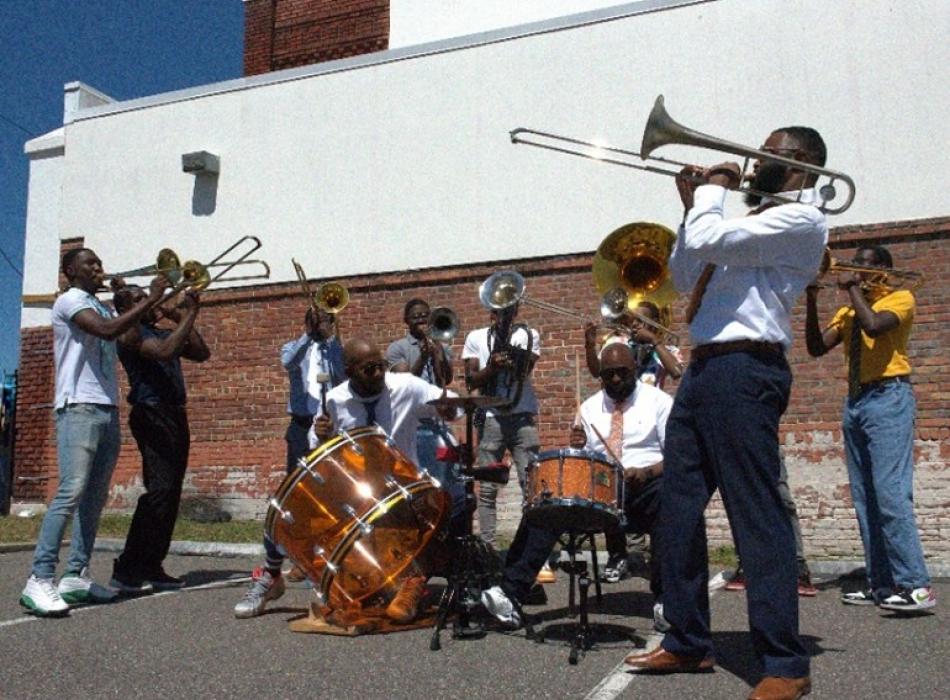
Cedric continues the tradition of Shout Band from his father, Cedric Mangum Sr., who has worked in the North Carolina area for years. Important to Cedric Jr.’s mission is not just to worship God, but to create a place for young men to learn music, grow spiritually, and be creative. This is seen in Cedric’s teachings and multi-generational makeup of the band, which range from middle-aged men to toddlers-in-training. If you are interested in hearing the heavenly tunes of brass and drums, come by the Folklife Area and see The Spirit of Joy.
Tomas Granado
Tomas Granado was born in Almont, Michigan, but he spent nearly his entire life in Florida. He was raised in Homestead, but Tom’s father, a farming contractor, took him with him when he traveled for work throughout the Midwest. In 1998, Tom and his wife moved to rural Central Florida, where he now runs the Granado Accordion Center and repairs instruments brought to him from as far away as Texas.
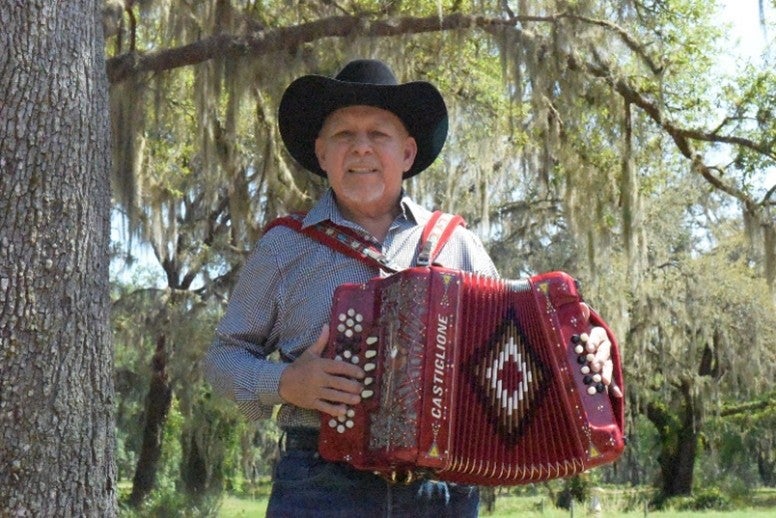
Tom’s love of accordions began when his father bought him his first accordion around 1965. Lacking a teacher or any other means of learning the instrument, he taught himself by imitating what he heard on 45s. Playing Conjunto and Norteño music with his friends led him to realize that there was no one in Homestead doing repairs on accordions, and Tom leapt into this work with the same enthusiasm, teaching himself with limited access to information and resources. His small shop is consistently busy doing repairs and maintenance on these instruments for players in a variety of musical traditions. Granado is a 2007 Florida Folk Heritage Awardee, a multiple time Master Artist in the Apprenticeship Program, and a veteran of many Florida Folk Festivals past.
Rich Field
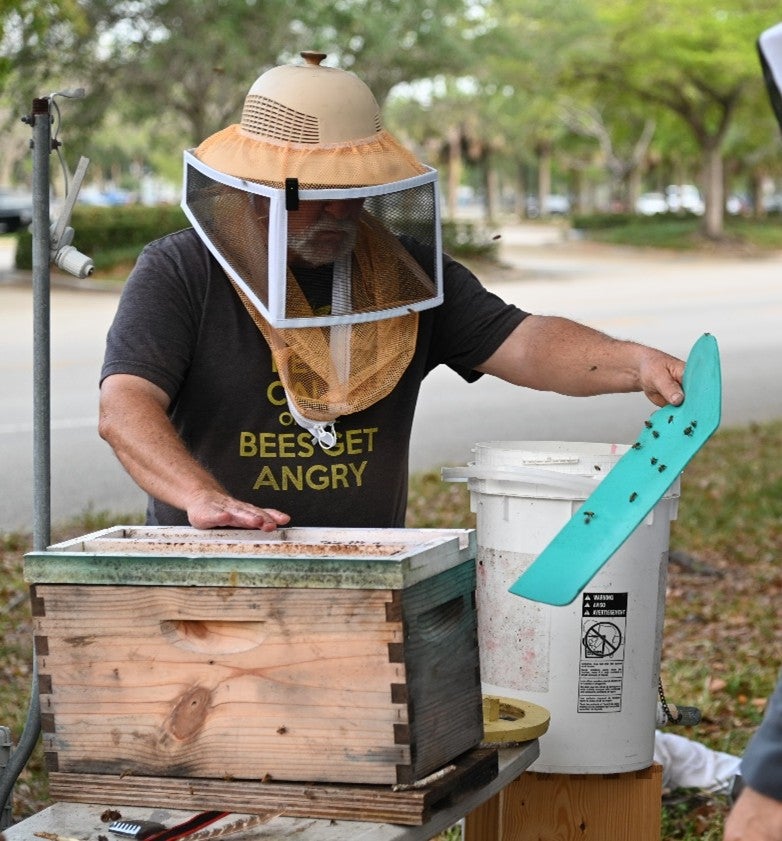
Rich Field was born on a US base in Germany and raised in Louisiana, and he moved to Florida in 1977. Although he came to beekeeping later in life, it was a natural next step after a career working with trees both in private industry and through enforcing public ordinances for the City of Sunrise. His beekeeping story started with finding a swarm in his yard, and Rich and his wife Beth worked together to capture the swarm and learn how to take care of a hive. Rich has become an expert in beekeeping and its history, and he has even built a reproduction of the casket hives used by O.O. Poppleton, the “Bee King of Florida” (1843-1917).
Rich’s approach to beekeeping is grounded in carefully observing the bees and working with their behavior and biology to support their needs. He notes that much of the structure of the hive is designed to help the bees manage temperature and ventilation, which the bees do through behaviors like rapidly flapping their wings at the entryway. He sums up his philosophy as follows: “I love it because bee's going to do what bee's going to do and it's up to us to figure out why.”
Mark and Alex Buncy
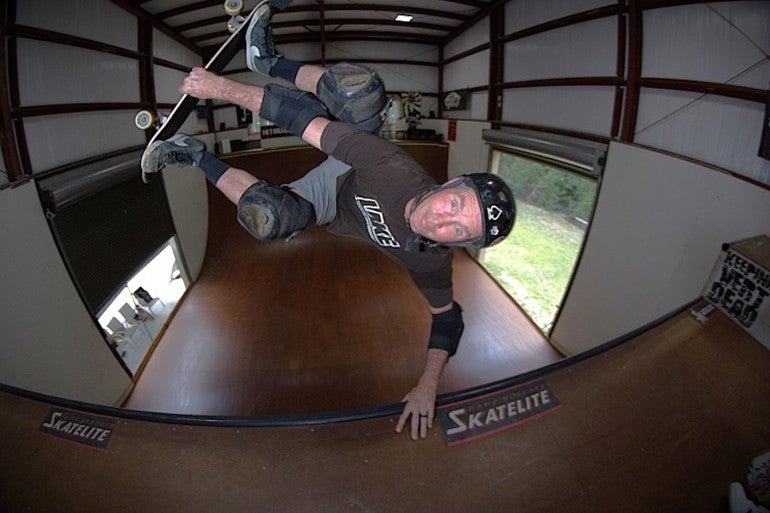
Located in Jupiter Farms, Florida, Mark and Alex Buncy are a father and son vert (vertical) skater duo. Vert skating is a style of skateboarding where one transitions up or down an incline or ramp to perform tricks.
The Buncys, out of love for this style and lack of local halfpipe infrastructure, built a halfpipe in their own backyard to further hone their skills. Mark has been skating for over forty years and still prefers vert now in his sixties. While he likes other forms, he says that there is a profound sense of weightlessness during vert. The tricks performed at the apex of the pipes/ramps form what we now see at events such as the X Games.
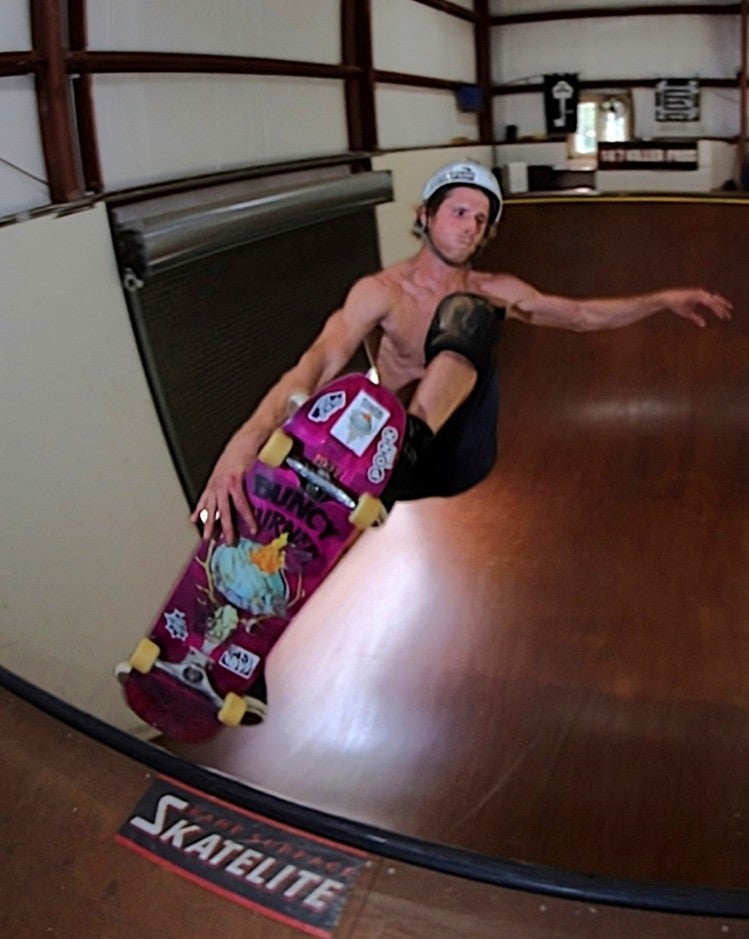
Alex began skating at two years old with Mark’s help and is now a pro-skater. Due to the space and resources required for vert skating, the practice is not as common today as street skating. Alex states that keeping the culture alive is a current goal of his. You can visit the Folklife Area to see this duo discuss their experiences and perform tricks as a part of this Floridian invention.
Jenny Hesoun
Jenny Hesoun is a slackliner, caver, climber, musician, and graduate student who lives in Tallahassee, FL. Originally a rock climber, she picked up slacklining during a trip which had no rock climbing available and has been working on it since then. Slacklining is the act of walking across a taut rope typically stretched between two trees. It is commonly viewed as an act of leisure; however, Jenny states that there are plenty of benefits to the activity such as keeping physically active, staying mindful, and having fun. While not yet a master, she embraces the challenge and enjoys building up her skills to become more well-versed on the various techniques required to stay on the line. In between practicing saxophone and studying, she sets up her line outside to get a quick session that helps her meditate.
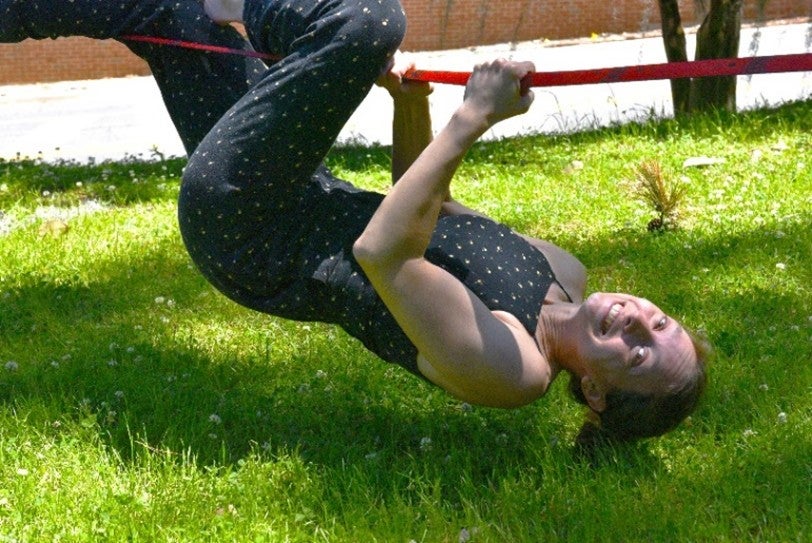
While seemingly a solo act, she states that she enjoys the communal aspect of helping out novices and enjoying the physicality of it with others. If you want to watch and learn how to slackline, Jenny will be demonstrating and performing at the Folklife Stage. Jenny will also be performing with the Hot Pepper Steppers at other stages around the festival.
Dr. Panayotis “Paddy” League
Dr. Panayotis “Paddy” League is Associate Professor of Musicology at Florida State University and Director of the Center for Music of the Americas. He specializes in the traditional music of the Greek islands, northeastern Brazil, Ireland, and their respective diasporas. While he lives in Tallahassee, Tarpon Springs is his home, and he is a master of the traditional folk songs and oral poetry from the Greek island of Kalymnos, the folk song repertoire that has flourished in Tarpon Springs over years of Kalymnian immigration to the town.
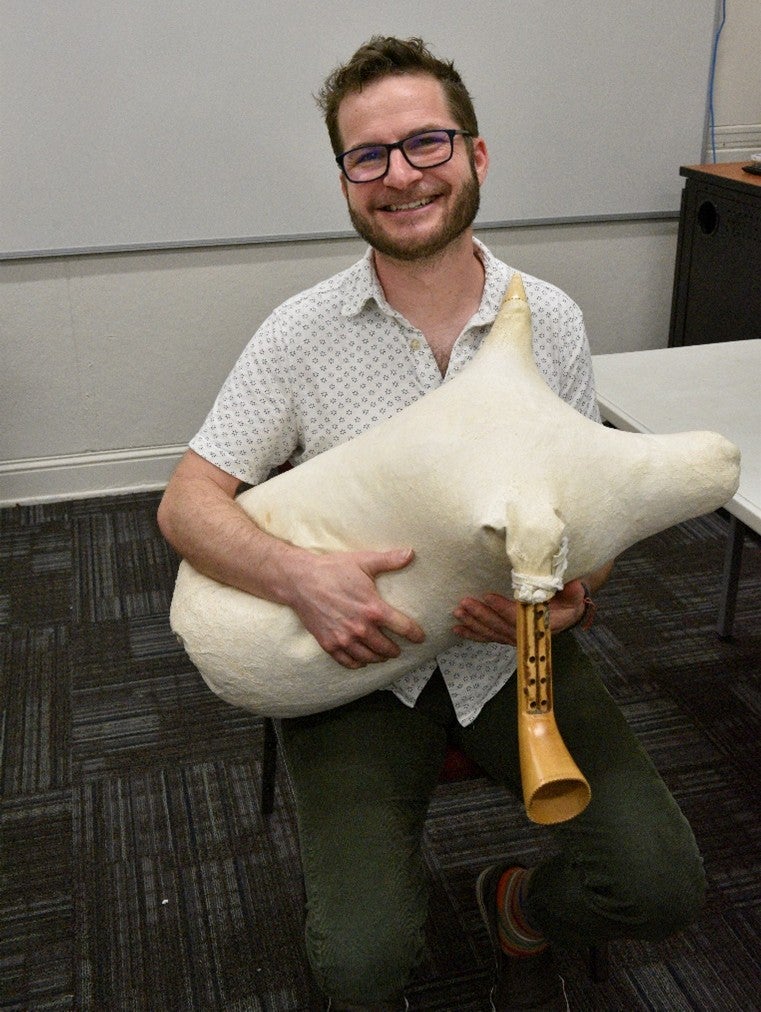
He is also one of the few living tsabouna players in the state of Florida. The tsabouna is synonymous with Kalymnian folk song and dance, and is a bagpipe made from the body of a goat, olive wood, bamboo, and beeswax. A dedicated practitioner of folk arts and performer at the Florida Folk Festival, Paddy can be seen across the festival performing and interacting with various stages and traditions.
Folklife Apprenticeship Program
The Florida Folklife Apprenticeship Program supports the preservation of folklife and traditional arts through one-on-one apprenticeships. These awards fund three-, six, or eight-month periods of study between a master artist and apprentice, recognizing the value of folklife and traditional arts in Florida while enabling participants to work together to maintain and share traditional knowledge, skills, and techniques. At the end of the apprenticeship term, the master artists and apprenticeships take to the folklife stage to demonstrate the finished product from their months of classes. This year, the folklife stage is proud to present four apprenticeship teams.
Betty Caloretti and Edward Bautista
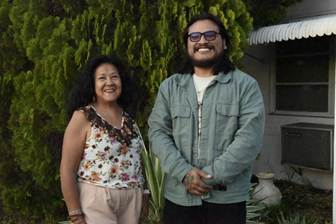
Apprenticeship Master Betty Caloretti is a master dancer and choreographer of Andean folk dances. Originally from Peru, she learned folk dances from her mother. Upon moving to Miami, Betty founded Sumaj Tusuy Peru, a dance company which not only teaches traditional Andean dance but also preserves and promotes of indigenous Peruvian cultural heritage across South Florida. Edward Bautista has been dancing with Sumaj Tusuy Peru since he was eight years old. He has become one of the principal dancers of the company. Through the Apprenticeship Program, Betty is training Edward to become a choreographer for the group, and to one day take over as director. At the Folklife Stage, you will see Betty, Edward, and several members of Sumaj Tusuy performing dances choreographed by Betty and Edward.
Freddy Fuerte and Cecilia Bohorquez
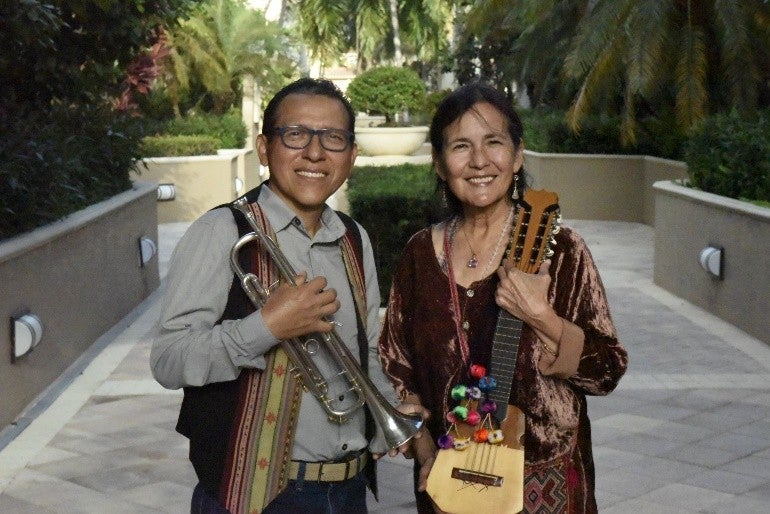
Master artist Cecilia Bohorquez has traveled the world studying voice and performing classical music. Originally from Lima, Peru, she came to California to study voice, and while she studied opera and Western classical music, she stayed connected to Peruvian Folk Music. Her father and his family spoke Quechwa, and she grew up loving Huayño music from the Peruvian highlands. In California, she joined the Peruvian ensemble Inca, where she was the principal vocalist and Charango player.
Apprentice Freddie Fuerte has similarly studied and performed across the world, his primary instrument being classical trumpet. He also hails from Peru, and from a family of Peruvian Brass Band musicians who would perform traditional music in parades and church festivals. He and Ceclia met in 2016 but have not had a chance to work together until the Apprenticeship Program. Cecilia is teaching Freddy Huayño music, as they play the trumpet, the charango, and of course the voice.
Annie Garcia and Belen Alverio
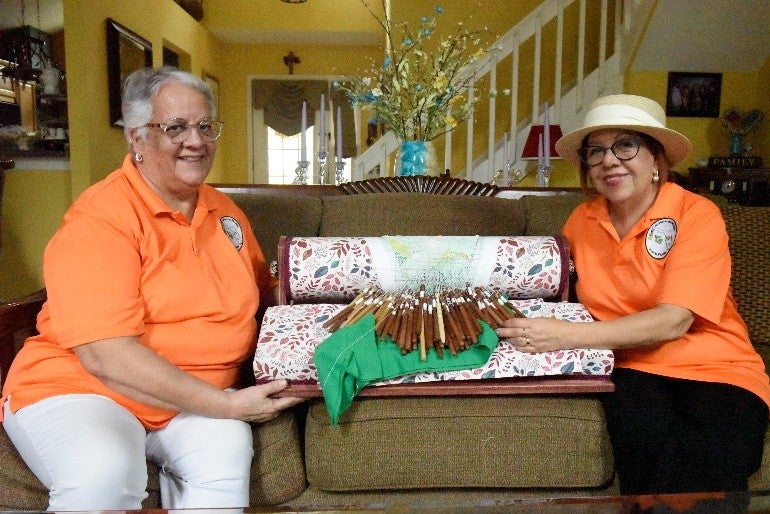
Making their second appearance at the Folklife Stage are Belén Alverio and Annie Garcia. A Florida Folk Heritage Award winner in 2024, Belén is a master lacemaker in the intricate art of Puerto Rican Mundillo bobbin lace. Using a Mundillo box, Belén makes lace by twisting and crossing thread with numerous bobbins. When Belén and her husband moved to Orlando, she founded a women’s Mundillo group called Las Damas Del Mundillo Orlando. Belen has since converted her garage to a Mundillo studio where more than a dozen women craft together every week, including Annie, who has been studying Mundillo with Belen since 2022. This is their second Apprenticeship with Florida Folklife, having worked together and appeared at the Folklife Stage in 2023. They will be working on their Mundillo projects on stage and at their table with the rest of Las Damas at the Folklife Stage.
Shauna O’Hara & Paul Groff
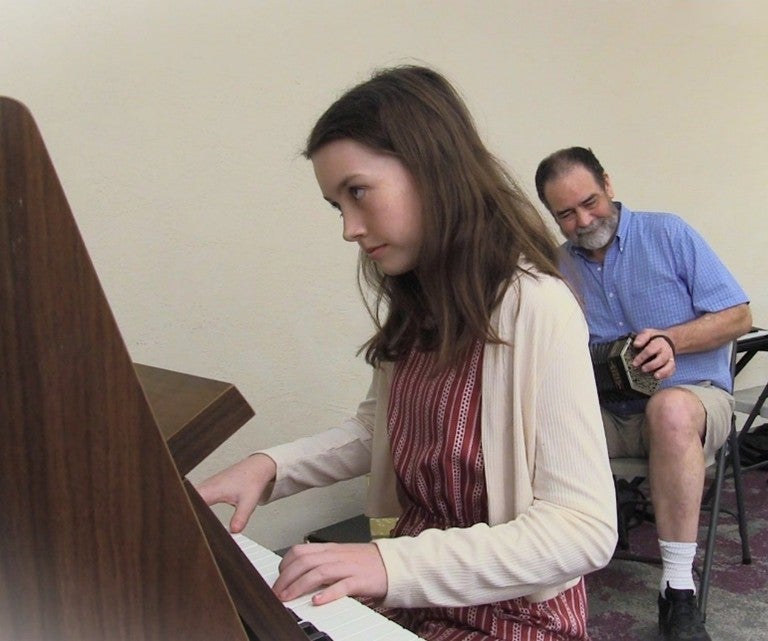
Also in their second year of the Apprenticeship Program are returning favorites Paul Groff and Shauna O’Hara. Paul has been teaching Shauna piano accompaniment (or backing) for traditional Irish folk music while he plays the accordion and concertina. Paul also collects and restores vintage Irish instruments. Shauna is a very accomplished and award-winning Irish step dancer who is utilizing the apprenticeship program to make the jump from dancing to accompaniment. Shauna’s extensive knowledge of Irish music from her many years of dance informs her piano playing, along with Paul’s many years of being a practicing Irish musician, from the UK, to Boston, to Miami. Since starting their apprenticeship, Paul and Shauna have been playing concerts in South Florida as he helps her enter the growing world of Irish Traditional musicians in Florida.
Major John Leroy Haynes Florida Veterans' History Program
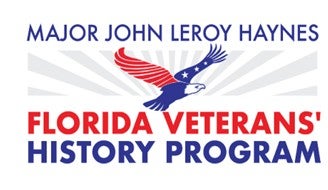
The Major John Leroy Haynes Florida Veterans’ History Program collects, preserves, and shares the stories of Florida’s veterans and the State of Florida’s military contributions throughout the nation’s history. By documenting veterans’ personal narratives, the program ensures their firsthand experiences remain accessible to the public and future generations. Through collecting written accounts, photographs, and memorabilia, and through recorded or audio interviews for the Program’s Oral History Collection, the Major John Leroy Haynes Florida Veterans’ History Program makes these narratives and the memories of military service by Florida’s veteran community accessible to the public and to future generations. Moderated by Division of Arts and Culture folklorist Julian Duncan, members of the “Florida Veterans’ History Spotlight on Aviation” panel are veterans from multiple services of the Armed Forces whose military service involved aviation as pilots and air crew members. Their stories are also a part of the Major John Leroy Haynes Florida Veterans’ History Program’s Oral History Collection. Discussions will center military life, aviation and veterans’ advocacy in Florida.
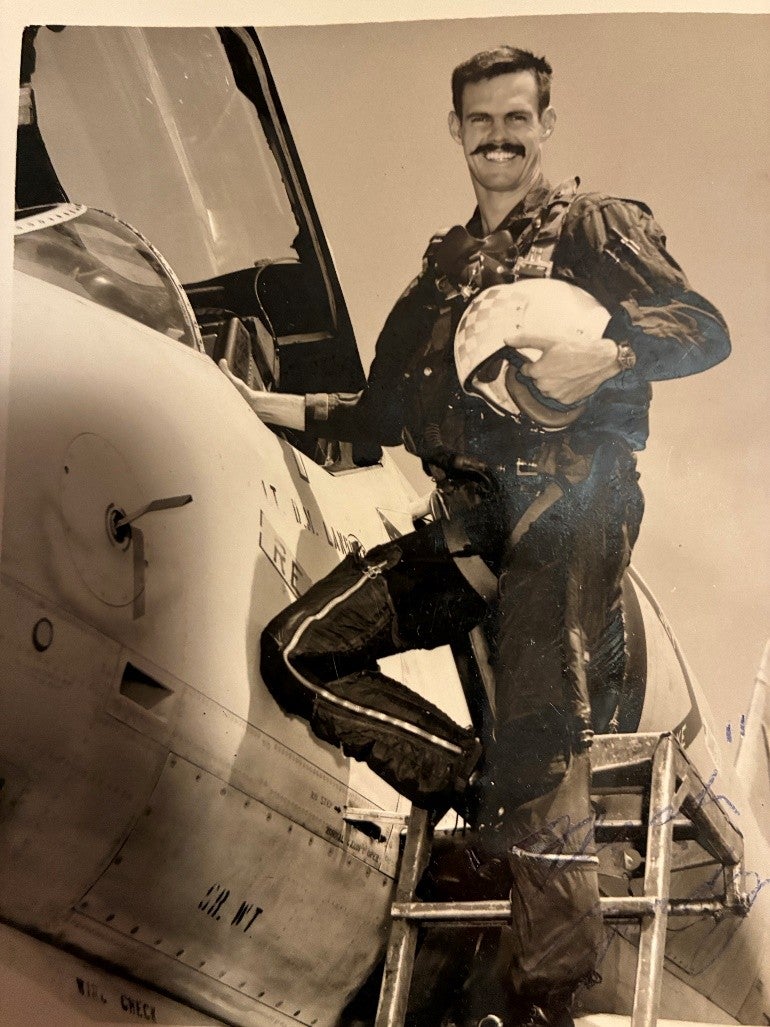
Gordon Hunter, 1968
Born in San Jose, CA, Lieutenant Commander Gordon Hunter (USN Retired) is a resident of St George Island. He attended UCLA on an ROTC scholarship, commissioning into the Navy and training in aviation in Pensacola, FL. Hunter was assigned to the USS Oriskany in October 1966, stationed in the Gulf of Tonkin. Shortly after his arrival, an accident occurred when a sailor ignited a flare and, in panic, through it into a weapons room containing other flares, causing an explosion that killed 44 sailors and forcing the ship to return to San Diego for repairs. By June 1967, The USS Oriskany returned to Vietnam. While there in 1967–1968, Hunter flew the A4 Skyhawk, a small, single-engine bomber as part of attack squadron VA-163,“Saints.” Hunter flew 296 missions, primarily tasked with disrupting enemy supply chains along the Ho Chi Minh Trail. After leaving active duty, Lt. Cdr. Hunter flew as a commercial pilot for Delta Airlines for more than 30 years and continued his service in the Naval Reserve.
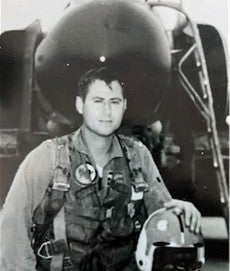
Michael Roehr, 1968
Lieutenant Colonel Michael Roehr, (USAF Retired) was born in Kansas City, MO and lives on St. George Island. He attended the University of Missouri at Kansas City and was commissioned in the Air Force through Officer Training School (OTS) in 1967. Roehr flew an impressive 465 combat missions in the F4 Phantom II throughout multiple tours in the late 1960s, focusing especially on interdiction of enemy supply lines. While stationed at George Air Force Base in California, Roehr transitioned to the F-105G “Wild Weasel,” a specialized fighter bomber used for air-defense suppression. He transitioned to the Air National Guard in 1979, where he stayed until retirement in 1987. Roehr subsequently flew cargo for FedEx for twenty years, allowing him to continue to pursue his love of flying and traveling. He is a member of American Legion post 106 and volunteered for many years for the Florida Highway Patrol Auxiliary, reflecting his continued service to his community after the military.
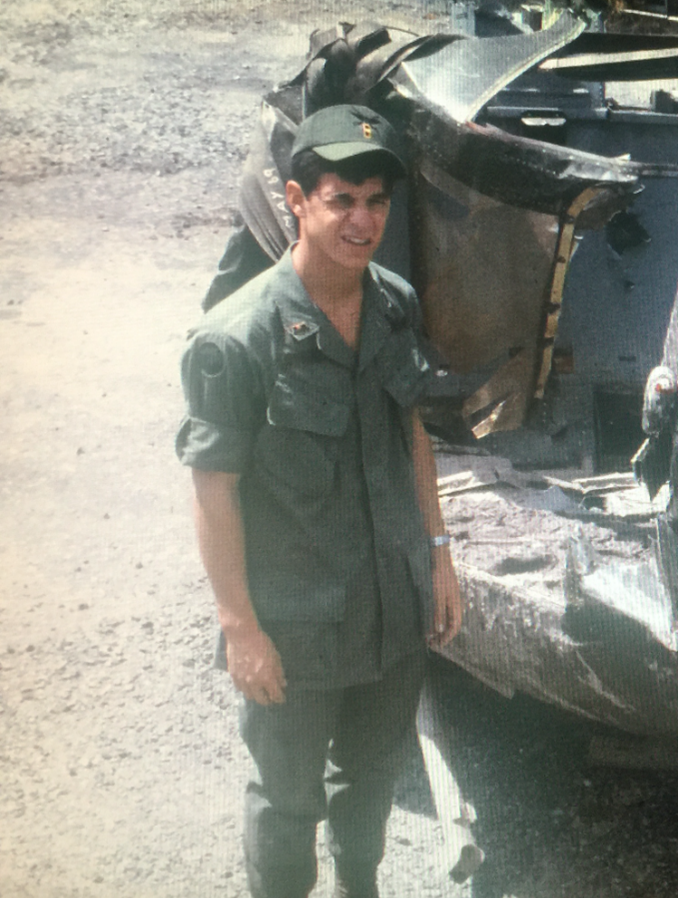
Boogie Knight, 1970
Warrant Officer Boogie Knight was born in Lynchburg, VA, where he grew up enjoying life on the farm, hunting, fishing, and spending time outdoors. An aviation enthusiast from a young age, Knight joined the United States Army after high school and attended Warrant Officer Candidate School, followed by Flight School. Knight deployed to Vietnam in 1969–1970, where he served with D Troop, 3rd Squadron, 5th Cavalry Regiment as an AH1 Cobra attack helicopter pilot. Knight flew high-risk missions known as hunter-killer operations. After returning from Vietnam, he worked as a flight instructor, before separating from the Army. He briefly worked in banking before leaving to follow his passion for horses. He became a professional trainer of American Saddlebreds and traveled the country showing horses, while flying in his spare time well into his seventies in his personal aircraft. Knight is a member of American Legion Post 106 and resides on St. George Island.
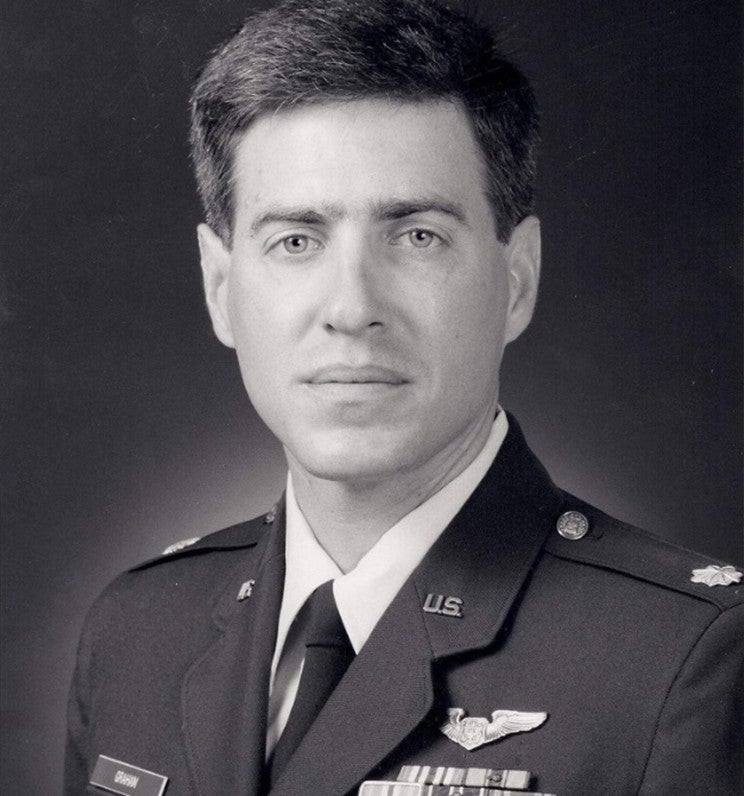
Harry Graham, 1992
Harry J. Graham III is a former U.S. Air Force officer and civil trial attorney based in Tallahassee, Florida. Commissioned through Officer Training School in 1983, he began his military career as an intelligence officer at Tyndall Air Force Base. In 1986, he transferred to the 7th Airborne Command and Control Squadron at Keesler AFB, where he was designated an Airborne Intelligence Officer and supported airborne command missions, logging significant flying hours.
Following active duty, Graham joined the Air Force Reserve, where he worked with U.S. Special Operations Command at MacDill AFB. He contributed to SCUD missile targeting during Operation Desert Storm and later deployed twice to Kuwait in 1992 to assist in rebuilding Kuwaiti defense capabilities. Graham completed law school as a reservist, ultimately serving as a served as a Judge Advocate General (JAG) officer and retiring with the rank of lieutenant colonel.
In civilian life, Graham clerked for the Florida Supreme Court before establishing a successful trial practice. He has tried cases across multiple Florida counties and remains active in veterans’ causes and legal advocacy.
Sacred Steel Summit
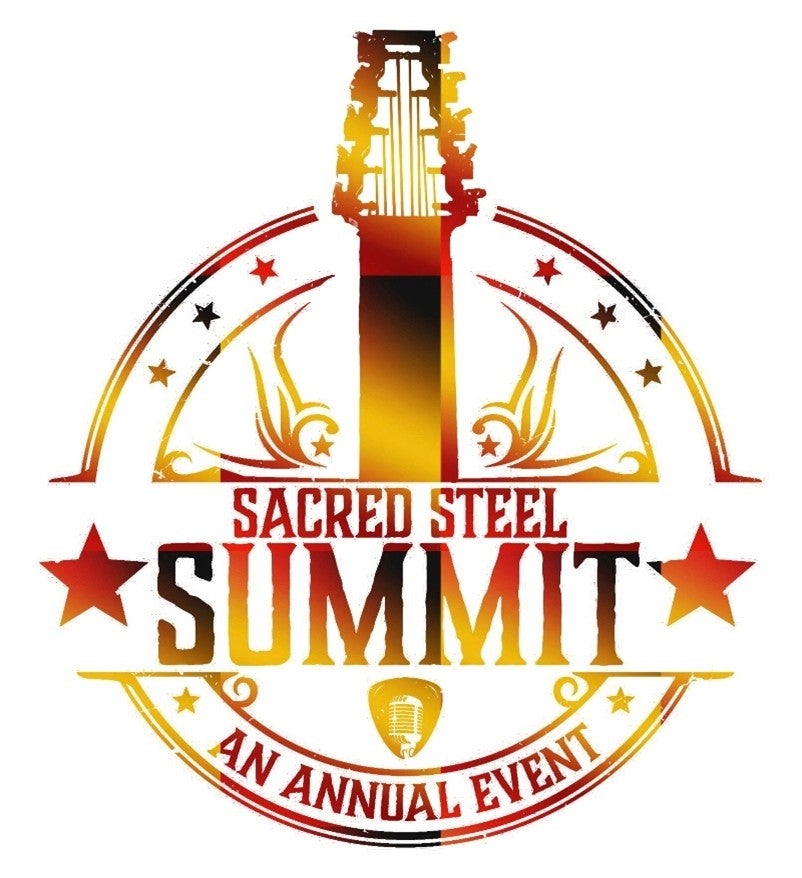
The third annual Sacred Steel Summit occurs inside the Florida Folk Festival and is organized by Florida Folk Heritage Award winner Alvin Lee of The Lee Boys. At their Sacred Steel stage, you will be able to see more than thirty-five sacred steel musicians, including legends of the genre like Ted Beard, Calvin Cooke, Chuck Campbell, Aubrey Ghent, Lonnie Bennett and The Lee Boys, as well as workshops, lectures, and music all night. Come get out of your seats and enjoy this special Florida tradition.
Three acts from the Sacred Steel Summit will be coming to the folklife stage. Friday will see Dontrail Wright and the Orange Machine, Saturday will feature Professor Frank Owens of the Lee Boys, and Tommy Phillips and Friends will perform on Sunday.
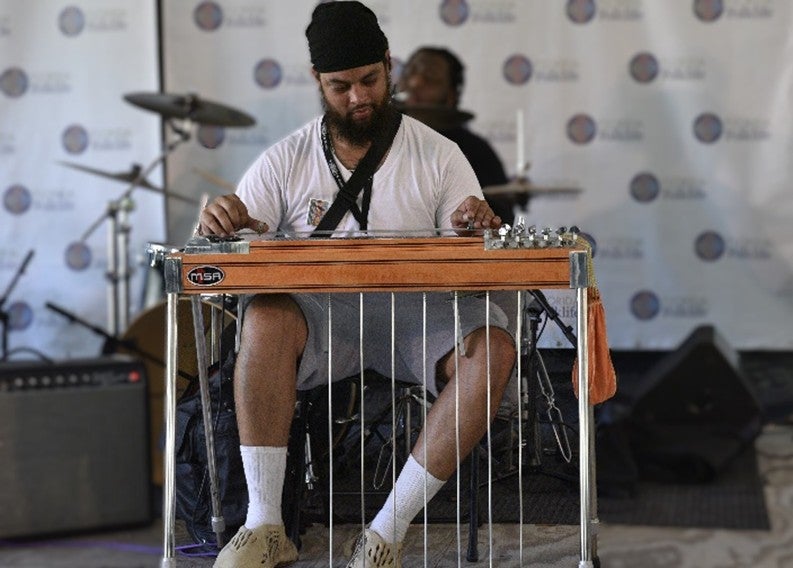
Dontrail Wright
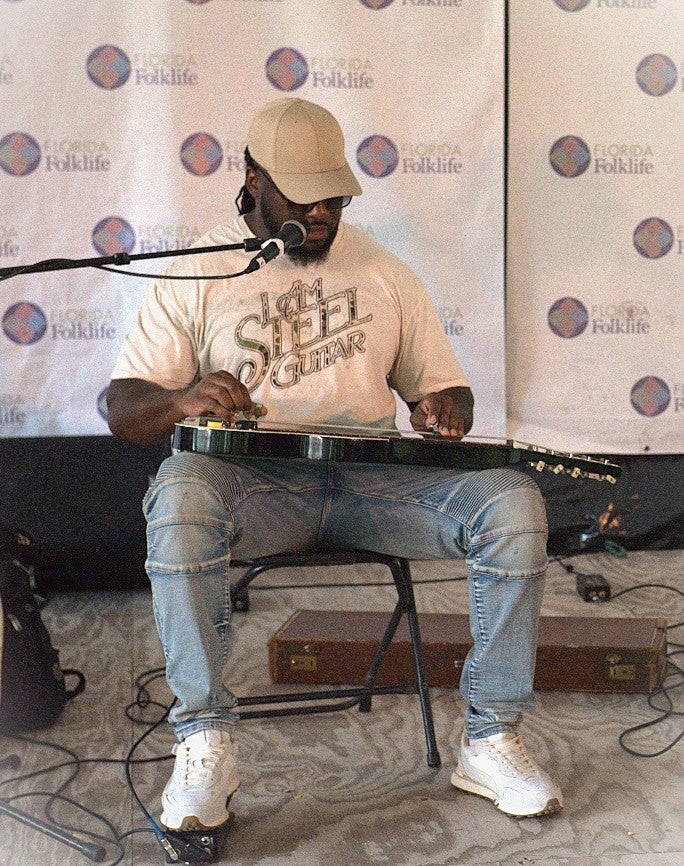
Professor Frank Owens of the Lee Boys
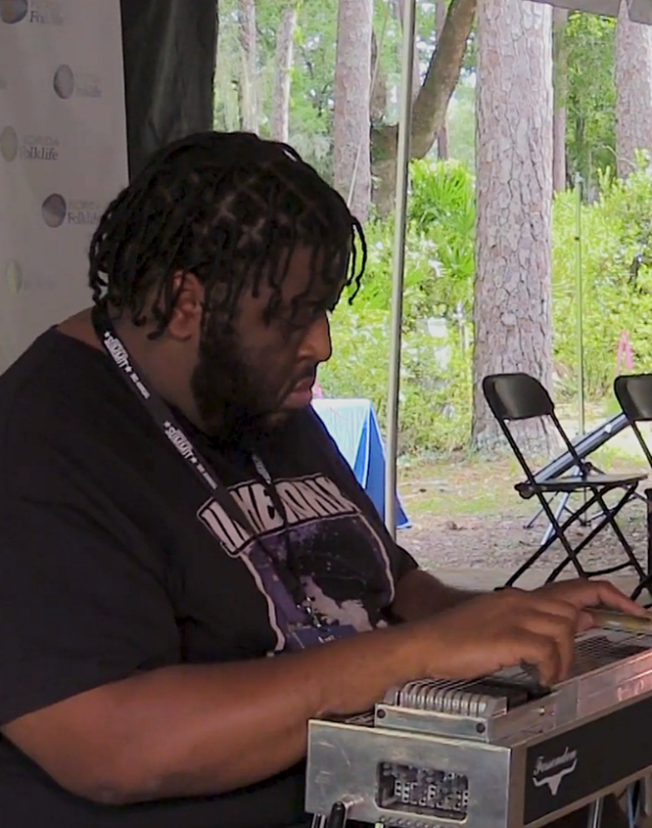
Tommy Phillips
Archivists Adam Watson and Chelsea Joslin assist patrons with research requests at the State Archives of Florida. In addition, they collaborate with the State Archives' Florida Memory Program to select and add digitized archival collections to FloridaMemory.com. Here, they present a sampling of Florida Folklife records—including film footage clips from previous Florida Folk Festivals and segments from documentaries created by Florida folklorists, as well as photographs and music selections from the Florida Folklife Collection that are held by the State Archives and accessible on FloridaMemory.com.
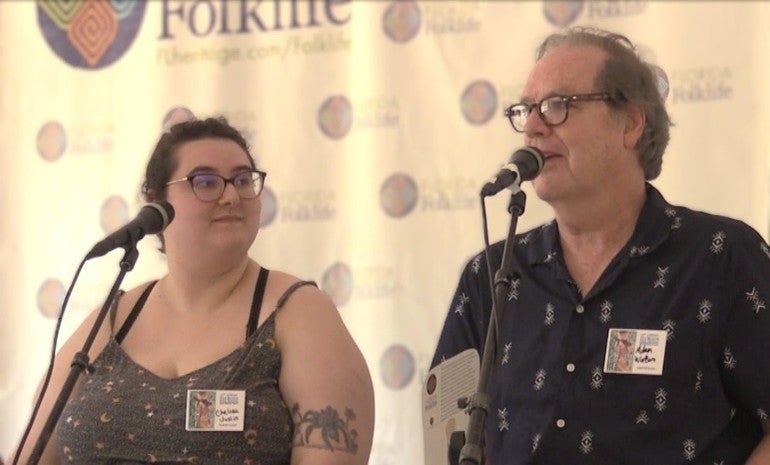
Chelsea Joslin and Adam Watson
